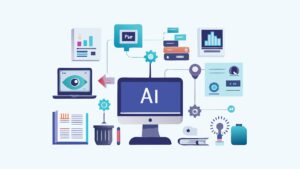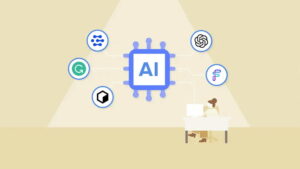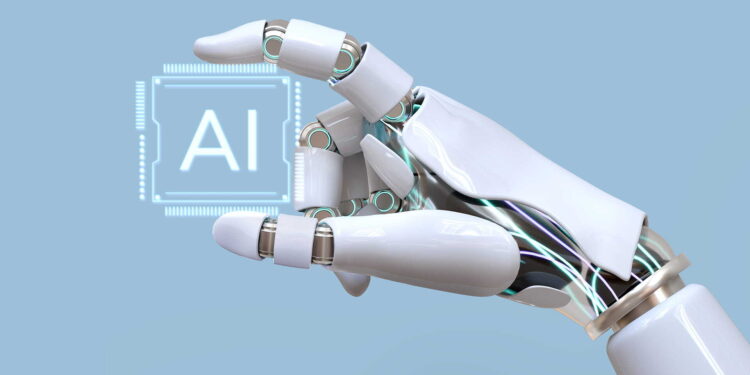AI tools are revolutionizing the creative world through increased efficiency, innovation, and data-driven insights, and simply with the rule of co-creation, this technology is bringing about brilliant masterpieces.
The rise of artificial intelligence (AI) tools is reshaping the way content is created, enabling businesses, marketers, and creators to work faster, smarter, and more creatively. AI-powered platforms are no longer just an innovation but a necessity in the competitive digital space. Its incorporation has done wonders across industries.
AI tools are now an essential part of the content creation process. These technologies free up creators to concentrate on strategy and storytelling by automating monotonous responsibilities, nurturing creativity, and guaranteeing accuracy. Businesses and individuals who embrace AI-driven content creation will be at the forefront of a fast-changing digital ecosystem.
Furthermore, AI tools are revolutionizing productivity, creativity, and insights in the creative economy, which is changing quickly. AI is becoming a potent collaborator, even though it also presents certain concerns to the livelihoods of content creators. Artificial intelligence is influencing content production in great ways and producing favorable results.
The Creator Economy is Being Revolutionized by AI tools

1. AI as a Force for Productivity
Time-consuming and repetitive jobs are common for creators. These days, AI tools, both free and paid, manage them effectively, freeing up creators to concentrate on their art.
- Video editing: AI can use preset parameters to put together rough edits intelligently.
- Transcriptions: Interviews are automatically transcribed using tools, which also provide captions.
- Research support: AI proposes popular subjects or creates video ideas.
Nonetheless, AI tools let creators focus on what truly matters, the creative spark.
2. AI as an Innovating Spark
By coming up with new ideas and offering creative support, AI is enabling creators to reach new heights of creativity.
Tools for idea brainstorming offer new ideas and variations.
- AI tools list and musicians work together to create original arrangements and try out different genres in music composition.
- Scriptwriting: To examine storylines or character motivations, creators employ AI.
For instance, AI can be used by a screenwriter who is having trouble coming up with ideas for new stories or surprising plot twists.
3. AI-Driven Perspectives
By analyzing enormous volumes of data, AI tools allow content producers to customize their work to the tastes of their audience.
- Analyze engagement to learn how people consume content.
- Content optimization: Develop data-driven tactics for particular audiences.
- Increasing audience loyalty: Use insights to create closer connections with your audience.
Success centers on connecting with your audience, and AI tools make this process data-driven and precise.

4. Resources to Help Artists
The following is a selection of carefully chosen AI technologies and AI tools that developers are experimenting with:
- Writing and Content Brainstorming
- Create ideas, plot points, and drafts based on initial notions using ChatGPT, Claude, and Gemini.
- Use case: Eliminate the difficulty of beginning with a blank page for creators.
- Tools for Visual Creation
- Leonardo.ai, DALL-E, and MidJourney: Create beautiful graphics based on text prompts.
- For instance, looking into YouTube thumbnail concepts or creating original content visualizations.
Editing photos: Photoroom, Cutout.pro, and Pixlr are excellent tools for:
- Elimination of the background
- Improving the quality of images
- Making graphics that are platform-optimized
- Repurposing and Editing Videos with AI tools
- Opus Clip: Condenses lengthy movies into manageable portions that are ideal for YouTube Shorts, Instagram Reels, and TikTok.
With its easy-to-use tools, Veed.io makes video editing simple and produces results that rival those of a professional.
- Cloning Voices and Narration with AI tools
- ElevenLabs: Offers voice cloning and a customizable voice library.
- Modify your accent strength, age, and gender.
- Speechify: Adds excellent narration and voiceovers to content.
- Create a near-perfect digital imitation of your voice with AI voice cloning.
5. New Platforms for AI
For particular uses, creators are investigating specialized AI tools list:
Engaging AI Experiences
Create chatbots or “Characters” with Character.ai to interact with fans by imitating fictional characters or historical individuals.
A Visual Creative Canvas
Runway: Use language prompts to create pictures, films, or music.
For instance, fluid image transitions can create effects similar to animation.
6. Using AI toolsto Create Music
By enabling anyone to create original songs using detailed suggestions, Suno democratizes the process of creating music.
Features of the AI tools list include input-driven chord, melody, and lyrics generation.
7. Anime and VTuber Niche Platforms
- Yodayo: Perfect for manga artists, VTubers, and fans of anime.
- Provides interactive AI-powered art creation with anime-style graphics.
- AI tools unlock endless possibilities for fans of niche creative genres.
A comprehensive look at how AI is transforming content production

1. Simplifying the Creation of Content
Time-consuming drafts are no longer necessary due to AI technologies like ChatGPT, Jasper, and Writesonic, which can produce well-written content in a matter of minutes. Natural language processing (NLP) is used by these platforms to comprehend context and create logical, captivating copy for:
- Posts on social media and blogs
- Descriptions of products
- Campaigns via email
For instance, by using AI tools to create a comprehensive blog post outline, a marketer can spend less time coming up with ideas and more time on strategy and optimization.
2. Using Idea Generation to Boost Creativity
By examining audience preferences and trends, AI tools for brainstorming generate countless original ideas. Tools such as BuzzSumo and HubSpot’s Blog Ideas Generator combine insights from popular content and keyword analysis to recommend themes for particular audiences.
3. Customizing Information for Viewers
Engagement requires personalization, and AI tools are excellent at it. AI systems examine user information to suggest tailored content depending on:
- The user conducts previous exchanges
- Preferences
As an illustration, Netflix and Spotify use AI algorithms to provide personalized suggestions and a smooth user experience.
4. Automating the Production of Visual Content
AI tools like Runway ML, DALL-E, and Canvas AI are revolutionizing video editing and graphic design. These instruments:
- Create images in response to text instructions.
- Provide templates that are automatically generated.
- Edit videos quickly and precisely.
Benefits: Without requiring in-depth knowledge of design or editing, creators can develop content that looks professional.
5. Content Optimization for Search Engines
MarketMuse and Surfer SEO are AI tools that optimize content for search engines by examining:
- Keywords
- Performance of competitors
- Readability
- Structure of content
These techniques make sure that content stays interesting for readers while ranking higher on search engine results pages (SERPs).
6. Making Things More Accessible
AI tools facilitate more inclusive content development by allowing:
- Audio and video material transcription is done automatically with programs like Otter.ai
- Translation of languages in real time for audiences around the world
- Text-to-speech capabilities for people with visual impairments

7. Improving Proofreading and Editing
AI-powered editing programs like Grammarly and ProWritingAid improve written material by:
- Recognizing punctuation and grammar mistakes
- Making style suggestions
- Improving clarity and tone
These AI tools list guarantee that content satisfies professional requirements while saving time.
8. Using data analysis to drive insights
AI tools that assess audience interaction metrics and forecast performance patterns include Tableau and Google Analytics 4. To improve their tactics and concentrate on content that appeals to their audience the most, content producers can make data-driven choices.
- AI’s Potential in Content Production
- AI is always developing, which divines well for further developments in content production:
- AI chatbots for real-time audience interaction
- Completely immersive AR/VR content experiences powered by AI
- Predictive analytics for the virality of content
Nonetheless, there is a future of Collaboration as creators can seize previously unheard-of chances to expand their audience, try out innovative forms, and effectively build their initiatives by embracing AI as a creative partner.
AI tools are not replacing creators, it’s empowering them to reach their fullest potential.













